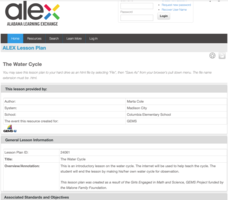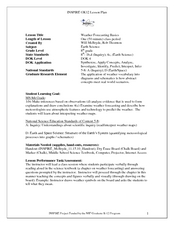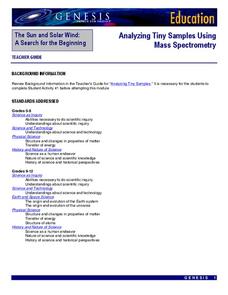Curated OER
Mantle Motions
Students define vocabulary words associated with lithospheric plate motions. They create and write down a motion to act out each vocabulary word, and participate in a game of demonstrating the actions associated with each word.
Curated OER
Properties of Liquids
Students describe properties of liquids and use descriptive language as a springboard to develop precise vocabulary for properties of liquids. They also use vocabulary as practiced with liquid-vocabulary card games. Finally, students...
Curated OER
Reduce, Reuse, Recycle and Respect
Second graders study the vocabulary that is associated with recycling and tell what recycling is. In this recycling lesson, 2nd graders use flash cards and Concentration type games to learn the vocabulary associated with recycling. They...
Curated OER
Spacecraft Launched on Mission to Pluto
Students read a news article about a space mission being launched to the planet Pluto. They study the necessary vocabulary and complete an anticipation guide of questions which they revisit after they read the article.
Curated OER
Fossil Fuels: Facing the Issues
Students explore energy by researching fuel usage on Earth. In this fossil fuel lesson, students define fossil fuels, the energy created by burning them, and the impact on the environment when using them. Students conduct pollution...
Curated OER
Amazon Water Cycle Role Play
Students participate in a role play where they play clouds, the ocean, rain drops, and more in order to learn about the water cycle. In this water cycle lesson plan, students have discussions and learn vocabulary.
Curated OER
Stopping Deforestation in the Amazon: A Publicity Campaign
Students investigate the environment by designing a group project. In this ecology lesson, students identify the man made threats to the Amazon while reading environmentally conscience vocabulary terms. Students collaborate...
Alabama Learning Exchange
The Water Cycle
Students explore the water cycle. In this earth science lesson plan, they read the book Water Dance by Thomas Locker and use an interactive whiteboard to review the water cycle with an interactive website.
Curated OER
Sowing Seeds
Students observe earth science by participating in a planting activity. For this seeds lesson, students identify the process for seeds to transform into plants which eventually produce food. Students sow seeds in the ground and...
Curated OER
The Greenhouse Effect
Seventh graders investigate the temperature change in open and closed containers. In this earth science lesson, 7th graders relate this lab activity to greenhouse effect. They create a line graph from data collected in the experiment.
Curated OER
Weather Forecasting Basics
Eighth graders analyze weather diagrams and weather maps. In this earth science instructional activity, 8th graders explain why it is important to know the weather. They complete a handout at the end of the instructional activity.
Curated OER
Me and My Shadow
Students apply the process of scientific inquiries or technological design to explore the explanations of the daily patterns of the Earth's rotation. They record different shadow lengths showing the apparent movement of the sun through...
Curated OER
Water Cycle in a Box
Fourth graders investigate how the water cycle is vital for all living things to survive on Earth. They observe the teacher set up a simulation of the water cycle using a Plastic Earth Simulator, desk lamp, and water, and make...
Curated OER
Making Hail
Fourth graders investigate the different types of precipitation and conduct a hail experiment. They identify the types of precipitation during a slideshow, and define key vocabulary terms. Next, in small groups they follow the...
Curated OER
Space Exploration to Find Habitable Planets
Students explore space science by reviewing scientific vocabulary terms. In this planet identification instructional activity, students identify the nine planets in our solar system and discuss which ones could potentially harbor life at...
Curated OER
Let's Create an Ecosystem
Seventh graders discover how an ecosystem works by creating one in class. For this Earth science lesson, 7th graders study vocabulary terms associated with ecosystem and read environment handouts. Students create an...
Curated OER
Characteristics of Energy
Students explore Earth science by completing energy worksheets in class. In this energy forms lesson, students identify and define a list of energy vocabulary terms and a K-W-L chart. Students view a matter video clip in class and...
Curated OER
Plate Tectonics & Land Forms
Fourth graders discuss the different interactions of plates and the ways mountains are created. For this plate tectonics lesson students complete an activity in groups.
Curated OER
Volcanoes: Kindergarten Lesson Plans and Activities
In the pre-lab, kindergarteners mimic the movements of the eruption of a volcano and discover various volcanoes around the United States. Then, pupils sort different types of volcanic rocks in the lab before learning how volcanoes grow...
NASA
Analyzing Tiny Samples Using a Search for the Beginning Mass Spectrometry
Teach the basics of mass spectrometry with a hands-on lesson. The fourth in a series of six lessons explores how mass spectrometry measures the ionic composition of an element. Learners then compare and contrast relative abundance and...
California Academy of Science
Tropical Belt
Where in the world is the equator? Explore a world map with your class, coloring in oceans, continents, and rainforests while locating the three major lines of latitude: the equator, Tropic of Cancer, and Tropic of Capricorn. Discuss how...
LABScI
Taxonomy: Who is in My family?
Find similarities in seemingly unlike organisms. The second instructional activity in a series of 12 builds the concept of a taxonomy and explores the use of a dichotomous key. Learners begin in part one by attempting to group a set of...
Chicago Botanic Garden
Migration, Adaptation, and Changing Climates
It is easy for humans to adapt to changing environments, but how do animals and plants do it? Classes discuss how plants and animals deal with environmental changes in the second of seven lessons. Through questions and discussions,...
NASA
Exploring Data
Bring the sun to your class! Young scholars analyze actual solar wind data in the second lesson of a five-part series. Their analysis includes speed, temperature, and density data.

























